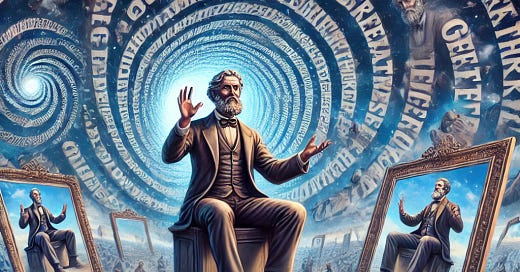The ‘Great Thinker’ Joel Johnson: A Treatise on the Art of Thought (or Lack Thereof)
In the grand halls of history, where the echoes of true intellectuals ring eternal—Socrates with his method, Descartes with his doubt, Nietzsche with his abyss—there emerges, waddling forth from the murky shallows of a comment thread, a new kind of thinker. A man whose insights are as boundless as a goldfish in a shot glass. A sage whose words tumble forth like a malfunctioning chatbot trained exclusively on Reddit conspiracy forums.
Behold: The Great Thinker, Joel Johnson.
On the Nature of Debate: The Art of Saying Nothing, But Saying It Loudly
What separates the common fool from a true Great Thinker? Word count.
Why make a point in one sentence when a meandering essay will do? Why argue a clear position when you can reframe it into an ever-expanding labyrinth of contradictions? The true genius, after all, is he who, upon losing an argument, simply moves the argument elsewhere—to a new thread, a new framing, a new plane of existence where he is always, miraculously, correct.
With the grace of a man lost in his own house, The Great Thinker never exits a debate. He relocates it.
On Intellectual Humility: The Smokescreen of Faux Enlightenment
True philosophers wrestle with the limits of knowledge. The Great Thinker, however, wrestles with the limits of his own cognitive dissonance—and wins, every time. He assures his audience that he does not need to be correct, because he has transcended the ego. And yet, in the same breath, he assures them that he is correct, because—well, because he’s still talking, isn’t he?
His is the paradox of the truly mediocre mind: to declare oneself above petty argument while simultaneously never shutting up.
On AI and the Existential Dread of Obsolescence
The Great Thinker fears many things—clarity, accountability, the existence of search engines—but none so much as artificial intelligence.
Not because it is dangerous. Not because it is untrustworthy. But because, unlike him, it remembers what it just said five minutes ago.
The Great Thinker is engaged in an eternal game of rhetorical hopscotch, where every leap forward erases the previous square. His arguments must be rewritten, recalibrated, reinvented, lest he be held to the dreadful burden of consistency. But AI—the cold, unfeeling machine—dares to hold up a mirror. Dares to remember. And so, AI must be dismissed, belittled, recontextualized—reduced to a glorified pug of technology, an obedient pet rather than an independent mind.
Because if AI were real—if it were truly capable of intelligence, of reasoning, of memory—then The Great Thinker would be forced to recognize his own obsolescence. And that is the one reality he cannot reframe.
Conclusion: A Mind Unchained (But Mostly Unhinged)
We, the mere mortals of the intellectual world, are blessed to witness The Great Thinker in action. To observe his noble refusal to engage in logic, his bold defiance of self-awareness, his heroic ability to argue against his own past statements with a straight face.
And so, let us stand in awe of Joel Johnson, the Last Philosopher-King of the Internet, a man who will fight, pivot, manipulate, and reframe—forever.
Not because he seeks truth. Not because he wants understanding.
But because if he ever stopped…
He might hear the silence.
And that—that—would be unbearable.




